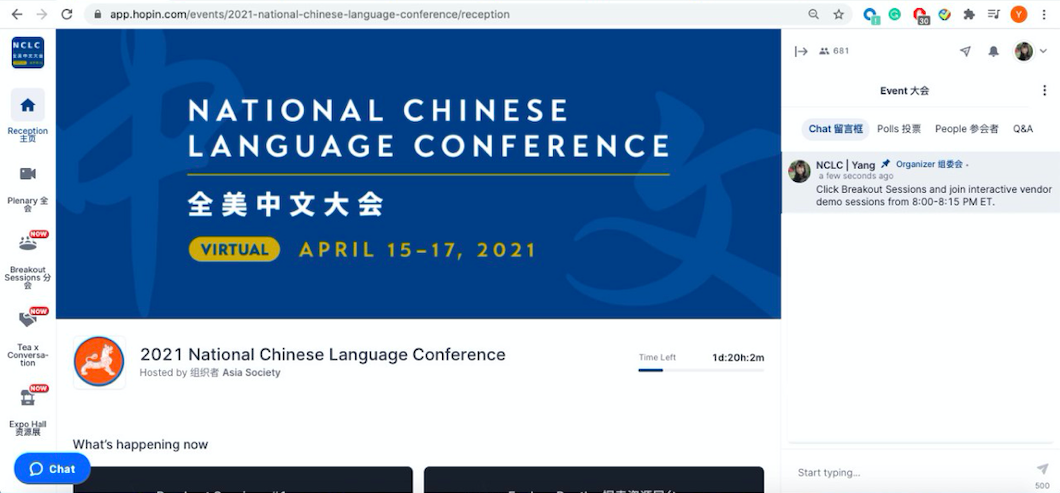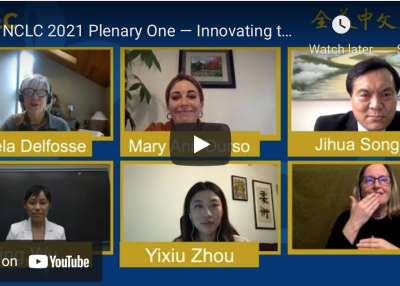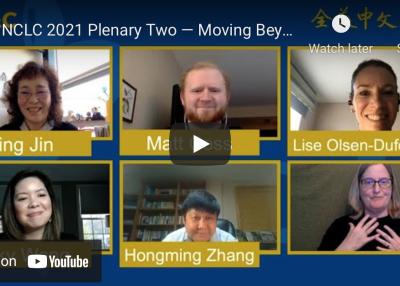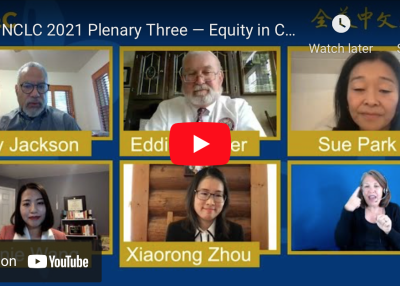2021 Virtual National Chinese Language Conference

The 14th annual National Chinese Language Conference was also the second virtual convening of nearly 1,200 Chinese language teachers and education leaders from 16 different countries/regions of the world. Over the course of the 3-day conference, April 15–17, 2021, participants had their choice of 41 breakout sessions, three plenary panel discussions, demonstrations and special discounts from 20 exhibiting educational companies, peer networking in the new Tea x Conversation sessions, live Taichi instruction, a first-ever career symposium, and four optional pre-conference workshops.
Key researchers and school leaders spoke at the conference. The first plenary opened with inspirational remarks by Asia Society President, the Honorable Kevin Rudd, and a panel discussion by a group of K–16 frontend innovative educators: Pamela Delfosse, Mary Ann Durso, Jihua Song, Ping Wu, and Yixiu (Karen) Zhou. Their topic was “Innovating the Traditional Classroom: Lessons Learned from Online Instruction,” and they reflected on the past year in particular as teachers and students have been compelled to problem-solve like never before. One conclusion is that, moving forward, there is indeed room for both technology and teachers. Educational tools will always be changing and evolving, but educators are needed to teach students how to think, communicate, show, and transfer their knowledge in order to problem-solve.
Click above to watch the NCLC 2021 Opening Remarks
Read highlights and watch the NCLC 2021 Plenary One panel discussion in full »
The second plenary, “Moving Beyond Novice Level Chinese,” was moderated by Ying Jin, who is an award-winning Chinese language teacher from California as well as a member of the ACTFL Board of Directors. This conversation comprised a group of rising and experienced language educators representing K–16, Startalk, the AP Chinese Development Committee, CLASS, and Courageous Dialogues with Chinese Educators: Matt Coss, Lise Olsen-Dufour, Vicky Wang, and Hongming Zhang. A resounding theme among these educators is that teachers must get out of their comfort zone to help make their lessons relevant to the interests and concerns of their student body. More technically speaking, teachers should not expect students’ writing to be at the same level of their Chinese counterparts, but rather they should help students strike a balance between their time spent learning and developing their speaking skills. Listening and speaking needs to be supported by reading and writing; we should make more effort to encourage students to read books in Chinese. Reading gives us an opportunity for independent input, which we don’t get in the classroom.
Read highlights and watch the NCLC 2021 Plenary Two panel discussion in full »
The third and concluding plenary, "Equity in Chinese Language Education," was moderated by Tony Jackson, Director for the Center for Global Education at Asia Society, who marshaled a powerful discussion among Eddie Conger, Sue Park, Bonnie Wang, and Xiaorong Zhou. Starting with a question, “Why is it important for Chinese language educators to address inequality in the classroom?” there was agreement that in this past year while students have been learning remotely, their very different needs have been magnified. Educators have a tremendous opportunity to create the schools our students deserve. There is power in global languages and citizenship, and developing an awareness of this among students empowers them.
Read highlights and watch the NCLC 2021 Plenary Three panel discussion in full »
The conference held two new offerings this year. The first, a career symposium titled “Level Up Your Career—from Teaching to Leadership” was led by Yulan Lin, CLASS Board of Director Emeritus, as well as the Former World Languages Supervisor at Boston Public Schools. Marty Chen, Steven Chuang, and Kathleen Wang shared their career journeys from teaching into areas of leadership, administration, and mentorship. In a live instruction workshop, Taichi/Qigong and meditation instructor Viviane (Wei-Chuan) Chen led participants in sitting, standing, and simple movement exercises, which sustain healthy alignment, and bring ease, relaxation, and energy flow to everyday life.
Presenters and participants alike made it clear that in this challenging year of the COVID-19 global pandemic, the Chinese language education field has risen to the occasion. Some of the most popular breakout sessions were focused on engaging students in a hybrid learning model; leveraging games and technology; and making distance instruction and learning more interactive. Educators continue to lead in innovations of online and hybrid learning, address equity and access in their classrooms, and grow their programs.
Special thanks to our Program Advisory Committee in helping to organize this year's stand-out conference program.


